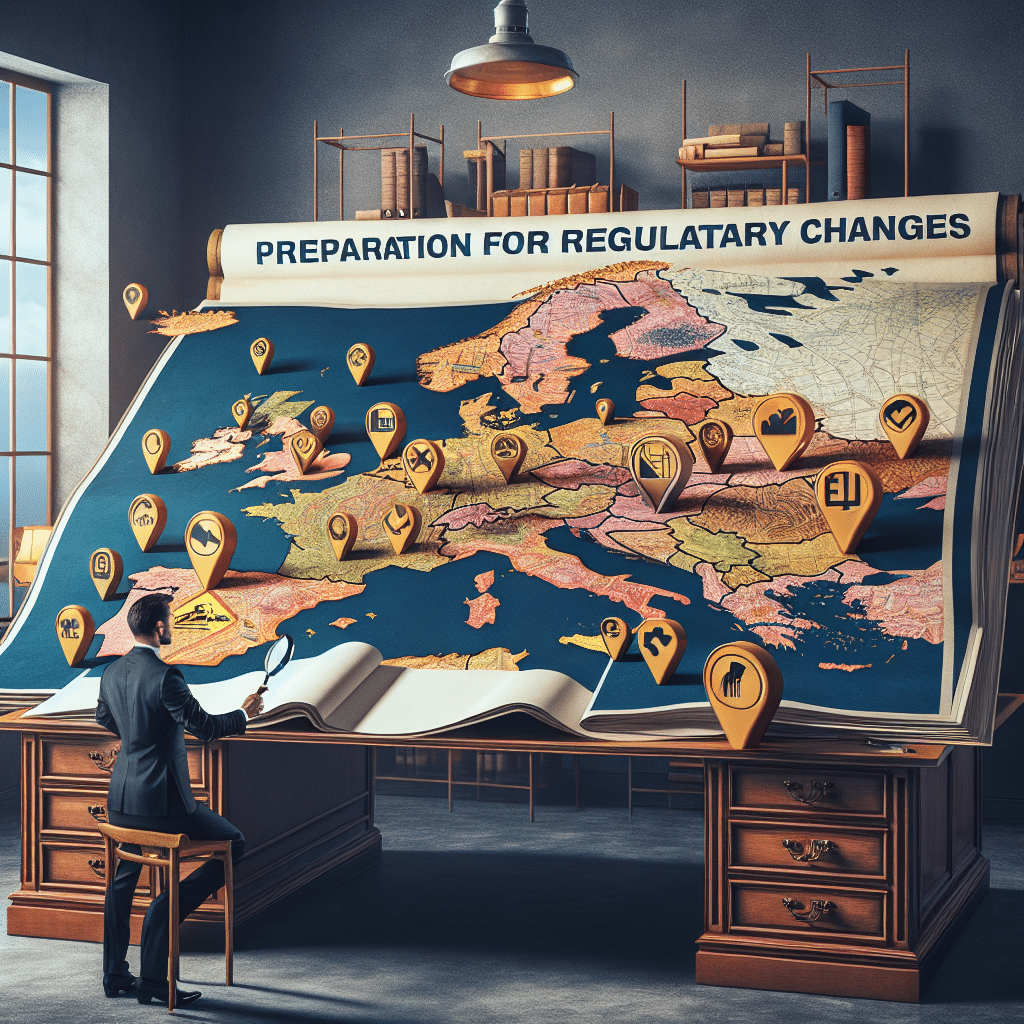Getting Ready for Regulatory Changes in Europe
-
Table of Contents
- Regulatory Changes in Europe: Preparing for the Future
- Understanding the European Regulatory Environment
- Anticipating Key Regulatory Changes
- General Data Protection Regulation (GDPR)
- Digital Services Act (DSA) and Digital Markets Act (DMA)
- European Green Deal
- Strategies for Preparing for Regulatory Changes
- Case Studies and Examples
- Conclusion: Key Takeaways for Staying Ahead
- ETChem: Your Partner in Meeting Regulatory Challenges
Regulatory Changes in Europe: Preparing for the Future

Europe has long been at the forefront of regulatory innovation, setting standards that often influence global policies. As we move further into the 21st century, the regulatory landscape in Europe continues to evolve, presenting businesses and individuals with new challenges and opportunities. Staying ahead of these changes is crucial for ensuring compliance, maintaining market access, and gaining a competitive edge. In this article, we will explore the key areas of regulatory change in Europe and provide insights on how to prepare effectively.
Understanding the European Regulatory Environment
The European Union (EU) is known for its comprehensive regulatory framework, which covers a wide range of sectors including finance, data protection, environmental protection, and consumer rights. The EU’s approach to regulation is often characterized by its emphasis on harmonization, consumer protection, and sustainability. As such, businesses operating in or with Europe must be vigilant in tracking and adapting to regulatory changes.
Anticipating Key Regulatory Changes
Several significant regulatory changes are on the horizon in Europe. These include updates to the General Data Protection Regulation (GDPR), the rollout of the Digital Services Act (DSA) and Digital Markets Act (DMA), as well as changes in environmental legislation such as the European Green Deal. Understanding these upcoming changes is essential for businesses to remain compliant and competitive.
General Data Protection Regulation (GDPR)
Since its implementation in 2018, the GDPR has set a global standard for data protection. However, as technology and data usage continue to evolve, so too does the GDPR. Businesses should anticipate further clarifications and potential amendments to the regulation, particularly in areas such as artificial intelligence (AI) and machine learning, where data usage is complex and rapidly expanding.
Digital Services Act (DSA) and Digital Markets Act (DMA)
The DSA and DMA are part of the EU’s strategy to create a safer digital space where the fundamental rights of users are protected and to establish a level playing field for businesses. The DSA will impose new obligations on digital services, especially large online platforms, to address illegal content and protect user rights. The DMA aims to prevent large platforms from imposing unfair conditions on businesses and consumers. Companies in the digital sector should prepare for increased scrutiny and compliance requirements.
European Green Deal
The European Green Deal is the EU’s ambitious plan to become climate-neutral by 2050. This initiative will lead to significant changes in environmental regulations, affecting industries such as energy, transportation, and manufacturing. Companies will need to adapt to stricter emissions targets, sustainable product requirements, and a potential carbon border adjustment mechanism.
Strategies for Preparing for Regulatory Changes
Preparing for regulatory changes requires a proactive and strategic approach. Here are some key strategies businesses can employ:
- Stay Informed: Regularly monitor regulatory developments through official EU channels, industry associations, and legal advisories.
- Conduct Impact Assessments: Evaluate how upcoming regulations will affect your business operations and identify areas that require changes.
- Engage with Policymakers: Participate in public consultations and engage with policymakers to influence the development of regulations that impact your industry.
- Invest in Compliance: Allocate resources to compliance functions and consider implementing technology solutions that can help manage regulatory requirements.
- Train Your Team: Ensure that your employees are aware of regulatory changes and understand their roles in maintaining compliance.
- Collaborate with Peers: Share best practices and collaborate with industry peers to navigate regulatory changes collectively.
Case Studies and Examples
Several companies have successfully navigated regulatory changes in Europe by implementing the strategies mentioned above. For instance, a major tech company actively participated in the GDPR consultation process, which allowed them to better understand the regulation and shape it in a way that was workable for their business model. Another example is a manufacturing company that invested early in sustainable technologies, giving them a competitive advantage when the European Green Deal was introduced.
Conclusion: Key Takeaways for Staying Ahead
Regulatory changes in Europe can be complex and far-reaching, but with the right preparation, businesses can turn these changes into opportunities. Staying informed, engaging with policymakers, investing in compliance, and fostering a culture of adaptability are all crucial steps in getting ready for the future of European regulations. By taking a proactive approach, businesses can ensure they not only comply with new regulations but also thrive in an ever-evolving regulatory landscape.
ETChem: Your Partner in Meeting Regulatory Challenges
As businesses prepare for regulatory changes in Europe, it’s important to have reliable partners that can support compliance efforts. ETChem’s protein products, including various types of collagen, are produced with the highest quality standards, ensuring they meet the stringent regulatory requirements of the European market. Whether you’re in the nutraceutical, pharmaceutical, or food and beverage industry, ETChem can provide the protein solutions you need to stay ahead of regulatory changes and maintain a competitive edge.
About ETChem:
ETChem, a reputable Chinese Collagen factory manufacturer and supplier, is renowned for producing, stocking, exporting, and delivering the highest quality collagens. They include marine collagen, fish collagen, bovine collagen, chicken collagen, type I collagen, type II collagen and type III collagen etc. Their offerings, characterized by a neutral taste, instant solubility attributes, cater to a diverse range of industries. They serve nutraceutical, pharmaceutical, cosmeceutical, veterinary, as well as food and beverage finished product distributors, traders, and manufacturers across Europe, USA, Canada, Australia, Thailand, Japan, Korea, Brazil, and Chile, among others.
ETChem specialization includes exporting and delivering tailor-made collagen powder and finished collagen nutritional supplements. Their extensive product range covers sectors like Food and Beverage, Sports Nutrition, Weight Management, Dietary Supplements, Health and Wellness Products, ensuring comprehensive solutions to meet all your protein needs.
As a trusted company by leading global food and beverage brands and Fortune 500 companies, ETChem reinforces China’s reputation in the global arena. For more information or to sample their products, please contact them and email karen(at)et-chem.com today.




